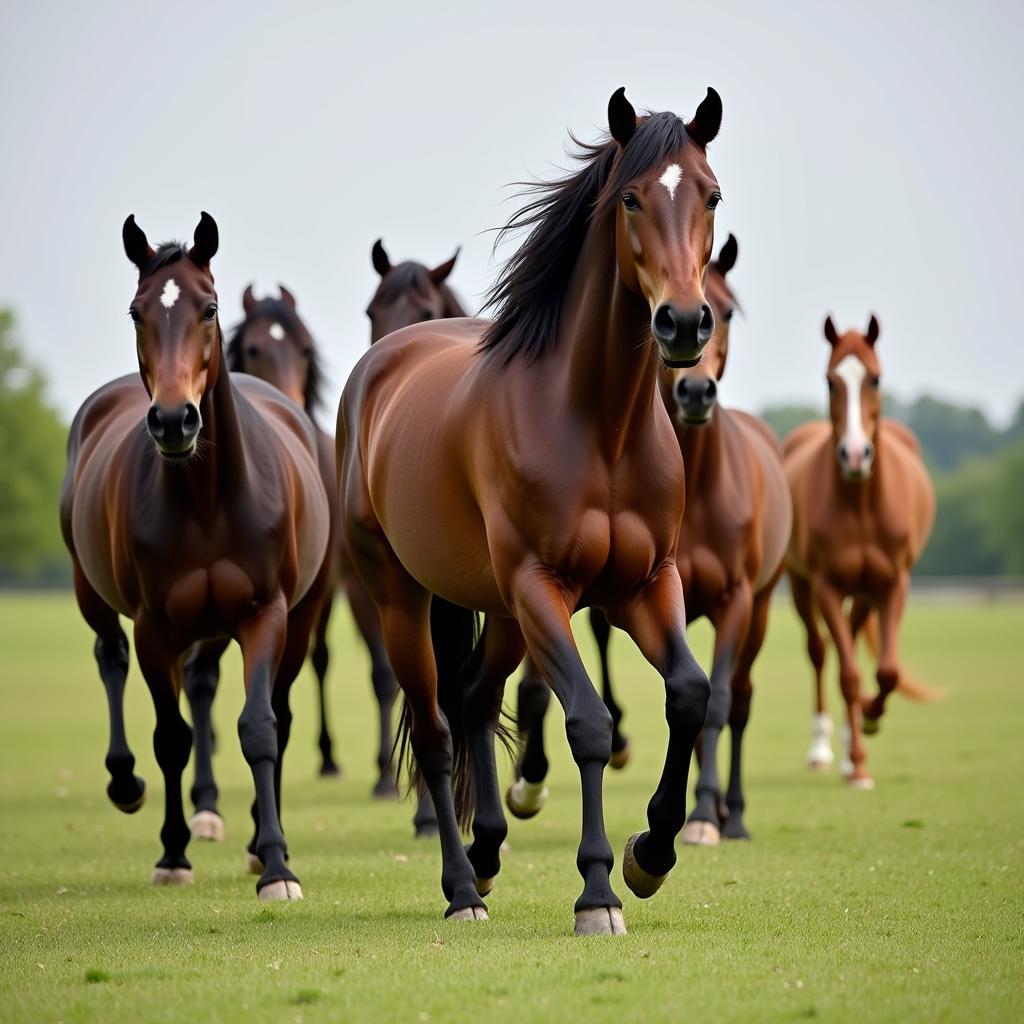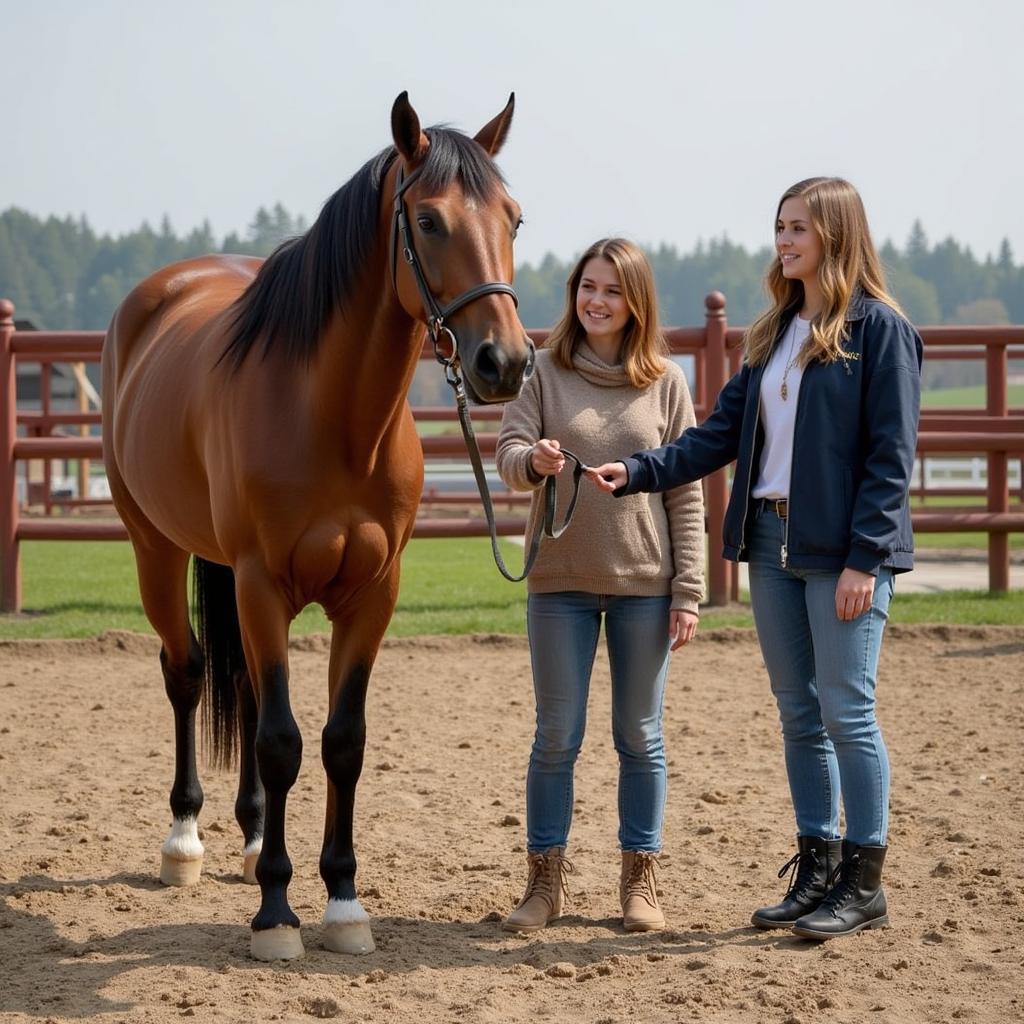The term “Ultra Boss Horse” evokes images of a magnificent equine, a true leader of the herd. But what exactly defines an “ultra boss horse”? This article delves into the characteristics, behaviors, and training considerations that contribute to the making of an “ultra boss horse.”
What Makes an “Ultra Boss Horse”?
An “ultra boss horse” isn’t just about physical dominance. It’s a combination of inherent traits, learned behaviors, and skillful handling. While some horses naturally exhibit leadership qualities, these can be nurtured and refined through consistent training and understanding. Key characteristics include confidence, intelligence, and a calm demeanor, even under pressure. These horses often possess a strong work ethic and a willingness to please, making them exceptional partners in various disciplines.
Identifying the “Ultra Boss Horse” in Your Herd
Spotting a potential “ultra boss horse” requires careful observation. Look for horses that exhibit natural assertiveness, but not aggression. They are often the first to explore new environments and the ones other horses look to for guidance. Their body language speaks volumes – a confident stance, a steady gaze, and a calm presence. They are the natural leaders, the ones who set the tone for the herd.
 Ultra Boss Horse Leading the Herd
Ultra Boss Horse Leading the Herd
The Role of Training in Creating an “Ultra Boss Horse”
While inherent traits play a vital role, proper training is crucial in shaping an “ultra boss horse.” Consistent, positive reinforcement methods build trust and encourage desired behaviors. Clear communication and firm but fair leadership from the handler are essential. It’s about developing a partnership based on mutual respect and understanding.
Training Techniques for the Aspiring “Ultra Boss Horse”
Effective training incorporates a variety of techniques. Groundwork exercises build a solid foundation, teaching the horse to respond to cues and develop self-control. Riding exercises further refine communication and responsiveness. Exposure to different environments and challenges helps build confidence and adaptability, crucial traits for an “ultra boss horse.”
 Training an Ultra Boss Horse
Training an Ultra Boss Horse
“A true ‘ultra boss horse’ isn’t born, it’s made. It’s the culmination of inherent qualities, consistent training, and a strong bond between horse and handler.” – Dr. Emily Carter, Equine Behaviorist
The “Ultra Boss Horse” in Different Disciplines
The versatility of an “ultra boss horse” extends across various disciplines. In dressage, their natural grace and responsiveness shine. In jumping, their bravery and athleticism allow them to tackle challenging courses. In trail riding, their confidence and surefootedness make them reliable partners. Regardless of the discipline, the “ultra boss horse” brings a unique combination of talent and temperament to the table.
The Importance of Temperament and Handling
Regardless of the discipline, managing an “ultra boss horse” requires a skilled handler. Understanding their personality and recognizing their cues is vital. A firm but fair approach is essential to maintain a balanced partnership.
“An ‘ultra boss horse’ requires a handler who is both a leader and a partner. It’s about understanding their strengths, addressing their weaknesses, and fostering a relationship built on mutual respect.” – John Miller, Professional Horse Trainer
Conclusion
The “ultra boss horse” represents the pinnacle of equine excellence. It’s a title earned through a combination of natural ability, dedicated training, and a strong partnership with a skilled handler. By understanding the characteristics and training requirements, we can nurture and develop these exceptional horses, unlocking their full potential and celebrating their unique qualities.
FAQs
- Can any horse become an “ultra boss horse”? While all horses can benefit from training, not every horse possesses the inherent qualities to become an “ultra boss horse.”
- What are some common mistakes to avoid when training an “ultra boss horse”? Being inconsistent, using harsh methods, and failing to establish clear communication are common mistakes.
- How do I know if my horse has the potential to be an “ultra boss horse”? Look for natural leadership qualities, confidence, intelligence, and a willingness to learn.
- What are the key characteristics of an “ultra boss horse”? Confidence, intelligence, calmness, a strong work ethic, and a willingness to please.
- What disciplines are “ultra boss horses” suited for? Their versatility makes them suitable for a wide range of disciplines, including dressage, jumping, and trail riding.
- How important is the handler’s experience in managing an “ultra boss horse”? A skilled handler is crucial for understanding the horse’s temperament and maintaining a balanced partnership.
- What are some resources for learning more about training and managing an “ultra boss horse”? Contacting experienced trainers, attending clinics, and seeking advice from equine behaviorists are valuable resources.
Need assistance with your “ultra boss horse” or other equine needs? Contact us at Phone Number: 0772127271, Email: [email protected] or visit our location at QGM2+WX2, Vị Trung, Vị Thuỷ, Hậu Giang, Việt Nam. Our customer service team is available 24/7.